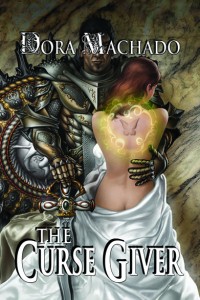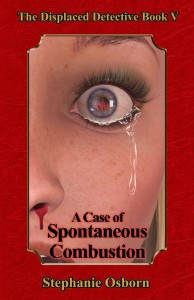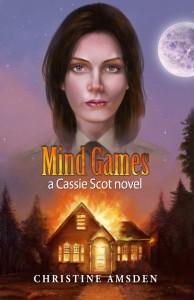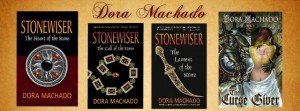Happy Earth Day everybody!
D.
Hello Everyone!
Just a short post to let you know that March 1-7 is Read an eBook Week. My publisher, Twilight Times Books, celebrates Read an eBook Week by making several titles available as FREE downloads from their critically acclaimed catalog. You will find fantasy, mystery, science fiction, historical and a lot more at http://twilighttimesbooks.com/freebies.html.
Enjoy!
D.

Hello everybody!
I’m delighted to share the good news below with all of you.
Thanks for sharing this moment with me.
Best regards,
D.
FOR IMMEDIATE RELEASE
June 30, 2014—The Foreword Reviews’ IndieFab Book of the Year Awards, judged by a highly selective group of librarians and booksellers from around the country, were announced on June 27th, 2014 at the American Library Association Annual Conference in Las Vegas. The Curse Giver, written by Dora Machado and published by Twilight Times Books, won silver in the fantasy category. Ms. Machado, who lives Florida, is the author of the award-winning Stonewiser series. Her latest novel, The Curse Giver, is also a Finalist in the Fantasy category of the 2013 USA Best Book Awards.
Midwest Book Review praised The Curse Giver as follows:
“Lovers of dark romantic fantasy will relish The Curse Giver. This was a wonderfully entertaining, absorbing read. The stakes are high, the conflict compelling, and the sympathetic hero and heroine will make you fall in love with them. Lyric at times, Machado’s prose flows beautifully throughout the pages, bringing to life her fictional world in full, vivid detail.”
Ms. Machado adds the distinguished 2013 IndieFab Book of the Year Award to her growing list of credits, which also include the 2012 Independent Publisher (IPPY) Silver Medal for SF/F, the 2010 Independent Publisher (IPPY) Gold Medal for SF/F and the 2009 Benjamin Franklin Award for Best Debut Novel.
Foreword’s IndieFab Book of the Year Awards program was created to discover distinctive books from the indie publishing community across a number of genres. What sets the awards apart is that final selections are made by real judges—working librarians and booksellers—based on their experience with patrons and customers. Representing hundreds of independent and university presses of all sizes, IndieFab winners were selected after months of editorial deliberation over more than 1,500 entries in 60 categories.
The editors and staff at Foreword Reviews love indie books and the art of great storytelling. They discover, curate, critique, and share reviews and feature articles exclusively on indie-publishing trends. Foreword Reviews’ quarterly print magazine is distributed across the United States to librarians, booksellers, publishers, and avid readers, and is available at most Barnes & Noble, Books-A-Million, indie bookstores, and by subscription. Foreword’s website features a daily stream of reviews of indie books written by a team of professional, objective writers.
For a full list of the winners searchable by category, publisher, title, and author, visit Foreword Reviews online.
****
Dora Machado is the award-winning author of the epic fantasy Stonewiser series and her newest novel, The Curse Giver, available from Twilight Times Books. She grew up in the Dominican Republic, where she developed a fascination for writing and a taste for Merengue. After a lifetime of straddling such compelling but different worlds, fantasy is a natural fit to her stories. When she is not writing fiction, Dora also writes features for Murder By Four, an award winning blog for readers and writers and Savvy Authors, where writers help writers. She lives in Florida with her indulgent husband and two very opinionated cats.
Author Contact Information:
E-mail:[email protected]
Website: www.doramachado.com
Blog: http://www.doramachado.com/blog/
Newsletter: http://doramachado.com/newsletter.php
Facebook: https://www.facebook.com/DoraMachado101
Twitter: https://twitter.com/DoraMachado
Publisher Contact Information:
Lida E. Quillen, Publisher
Email: [email protected] – or –
Website: http://www.twilighttimesbooks.com/
ForeWord Contact Information:
Contact: Jennifer Szunko, Director of Marketing/Circulation
Foreword Reviews [email protected] 231-933-3699
Dear Readers.
I’ve been getting a lot of questions from you regarding how I came up with the original concept for The Curse Giver. In an effort to answer these questions, I’d like to share this essay that I wrote for The Curse Giver‘s release.
Enjoy!
D.
******
So, you’ve been wondering: How on earth did I come up with the concept for The Curse Giver?
The Curse Giver was an accident, a professional indiscretion, if you will, conceived during one of my little escapades, and born out of unchecked passion. Yep, I might as well come clean. Even the most disciplined writer can be unfaithful to her projects, and no matter how thoroughly taken one is with one’s current novel, the danger for a tangent is always there when venturing into the world of research.
So there I was, researching one book, working hard to finalize the Stonewiser series, when I came across this insidious little idea that kept disrupting my train of thought.
Now, to understand the story behind The Curse Giver, you must understand me and my writing habits. I’m not easily distracted. When I’m writing a novel, my brain goes into hyper mode. I’m disciplined, motivated and focused to the point of obsession, which is why The Curse Giver was such a surprise to me.
The subject of curses has always fascinated me, not only because curses are such a vital part of magic and fantasy, but also because they are so prevalent to the human experience. To be honest, I had always been intrigued by the subject, but didn’t delve into it, until one very late night—or was it very early morning?—when the wind rattled my window as a coastal storm blew in from the sea.
The clay tablets that popped up on my screen dated from 600 BC and were part of the library of Nineveh, also known as the library of Ashurbanipal, the oldest surviving library of cuneiform tablets. This is the same collection that gave us the famous Gilgamesh epic. Visually, the tablets weren’t much to look at, chicken scratches on clay. But the translated words had an impact on me.
“May all these [gods] curse him with a curse that cannot be relieved, terrible and merciless, as long as he lives, may they let his name, his seed, be carried off from the land, may they put his flesh in a dog’s mouth.”
I know, hardly an inspiration for most. Me? I immediately thought of the man who had been thus cursed, of the pain and hardship such curse would bring upon him and his people, of the character that eventually became Bren, Lord of Laonia in The Curse Giver.
From there on, the curses flowed before my eyes, mysterious ones from ancient civilizations in Egypt, India and the Far East; thin lead tablets dating from the Greco-Roman world, judicial prayers, secret invocations, warnings and love spells that streamed into my consciousness. I knew I should get back to my original research, and yet I was smitten with the subject.
There were curses quoted from the Bible, medieval curses, real and forgeries, Viking, Celtic, Germanic, Visigoth, Mayan, Incan, Hopi, you name it. There were ancient curses but also modern curses, some associated with Santeria, voodoo and the 21 Divisions, religions that are common in the Dominican Republic where I grew up.
Who would cast these curses and why? What kind of creature could be capable of such powers? What would motivate a person to curse another one? As I explored these questions, a character profile began to emerge in my mind, someone whose understanding of good and evil was very different from my own.
Sorting through the research, I could see that some curses had practical applications to make sure people did what they were told. They served as alternate forms of law enforcement in lawless societies. Some were obviously malicious. They were meant to frighten and intimidate. Some were more like venting or wishful thinking. It turns out that mankind has been casting curses since the beginning of time and will probably continue for as long as we have the imagination and faith to do so.
A new question formed in my mind. Once cursed, what could a person do to defend himself? A third character emerged from this question, Lusielle, a common remedy mixer, a healer of hearts and bodies, someone who didn’t realize the scope of her own power until it began to transform her life.
Eventually, I wrestled myself out of the trance. I had a book to write and a series to complete. I had deadlines. But my little detour had made an impact. The concepts were at work in my subconscious, coalescing into a new novel, fashioning these powerful characters who demanded their own story. My encounter with curses had been but a slight detour from my research plan, a tiny deviation, an indiscretion to my schedule, but the seed had been planted and The Curse Giver thrived, even if I didn’t know it yet.

A guest Post
by
Stephanie Osborm

Hi Folks,
I’m delighted to welcome my Twilight Times Books colleague, Stephanie Osborn, to my blog. Stephanie is celebrating the release of the fifth book in her stellar Sherlock Holmes Displaced Detective series. Today she talks about the challenges of writing a British character in the context of an American novel.
Enjoy!
D.
****
I’m sure you’ve all seen it.
We in America would say, “I don’t recognize this caller ID on my cellphone; I thought this app specialized in emphasizing identification. Could you wake me up at seven in the morning? Everything has been taken care of, but I have to run over and see Mom before the announcement is publicly known.”
But a Brit would say the same thing like this: “I don’t recognise this caller ID on my mobile; I thought this app specialised in emphasising identification. Would you knock me up at seven in the morning? It’s all sorted, but I have to pop over and see me Mum before the announcement is publically known.”
It’s the difference between the American version of English, and the British version of the same language. Sometimes people who travel back and forth between the two countries — the US and the UK — have been known to remark, “We speak the same language, but we don’t.”
And the difference encompasses terminology, slang, and even spelling.
Did you know that J.K. Rowling was made to change the name of the very first book in the Harry Potter series before it could be published in the USA? The original title, the title you’ll find on bookstore shelves in London, is Harry Potter and the Philosopher’s Stone. But publishers felt that Americans might not recognize the alchemical reference, and so it was changed to Harry Potter and the Sorcerer’s Stone. And you may, or may not, be familiar with the use of “trainers” to mean athletic shoes, or “jumper” to refer to a pullover sweater. Cell phones are “mobiles” and refrigerators, regardless of brand, are “Frigidaires.” (I suppose this is analogous to our referring to all disposable facial tissues as “Kleenex” and cotton swabs as “Q-Tips.”)
Americans may call it a plow, but Britons call it a plough — that was even a major clue that Holmes found in one of the original adventures, denoting the suspect wasn’t British as he claimed. There is, it seems, and has been for something like a century and a half at the least, a tendency for Americans to eliminate so-called silent letters and spell more phonetically than our British counterparts. But at least Sir Arthur Conan Doyle only had to write in one version thereof.
When I started writing the Displaced Detective series, which has been described as, “Sherlock Holmes meets The X-Files,” I made a deliberate decision: If the speaker was American, dialogue (and later, thoughts and even scenes from that character’s point of view) would be written in American English. If the speaker (thinker, observer) was from the United Kingdom, dialogue etc. would be written in British English. This has held true right down to the book currently being released, A Case of Spontaneous Combustion, book 5 in the series (with at least 3 more in work, and more in the planning stages).
The series itself traces the exploits of Sherlock Holmes — or one version of Holmes, at least — when he is inadvertently yanked from an alternate reality in which he exists in Victorian Europe, into modern, 21st Century America. Because in his particular alternate reality, he and Professor Moriarty were BOTH supposed to die at Reichenbach, if he is returned, he must die. So he wisely opts to stay put and come up to speed on the modern world. Working with Dr. Skye Chadwick, her continuum’s equivalent to Holmes and the Chief Scientist of Project Tesseract (the program responsible for his accidental transition), Holmes ends up being asked to investigate unusual and occasionally outré situations.
In his latest foray, after an entire English village is wiped out in an apparent case of mass spontaneous combustion, London contacts The Holmes Agency to investigate. Holmes goes undercover to find a terror ring. In Colorado, Skye battles raging wildfires and mustangs, believing Holmes has abandoned her. Holmes must discover what caused the horror in Stonegrange and try to stop the terrorists before they unleash their bizarre weapon again, all the while wondering if he still has a home in Colorado.
And the cast of characters includes an American FBI agent, several members of the US military, two entire units of MI-5, and more. All of whom have to be rendered in their appropriate version of English.
Simple, you say? Just set Word to use the British English dictionary.
Right. Except then Skye, Agent Smith, Colonel Jones, and the other Americans would then be speaking Brit.
“So set both dictionaries operational,” you suggest.
Great idea. I’d love to. But Word doesn’t have that option — the two dictionaries would conflict. And even if it could use both, how would it know whether an American or an Englishman were speaking? More, one of those characters — Holmes himself — actually uses a somewhat archaic form of British English, in that he is a man of the Victorian era, and speaks in such fashion. So I am really using three different forms of English.
Well, the end result is simply that I have to make sure I read back through the manuscript very carefully, looking for places where either I’ve slipped up, or autocorrect replaced the British with the American equivalent (which it does every chance it gets). I’m also pleased that my publisher has assigned me a regular editor who is quite familiar with the British version of English, to include the euphemisms, exclamations, and general slang. She’s been amazingly helpful, and I do my best to stay up to speed on the latest version of slang in both the US and the UK.
So what has been the response?
Well, I’ve had one or two Amazon reviews refer to “misspellings,” and there’s one venerated author (of whom I like to refer as one of the “Grand Old Men of Science Fiction”) who is currently reading the first couple of books in the series and is amazed that I even attempted to pull such a thing off, let alone that I’m doing it.
But other than that, it’s rather strange; not one reader has volunteered the observation that I am writing in two different forms of the English language. Yet the sense among fans of the series is that I have captured Doyle’s tone and style, despite the fact that I do not use a first-person Watson narrative, despite the fact that we see what Holmes is thinking, at least to a point.
I believe the reason is because, subconsciously, readers are picking up on the fact that Holmes speaks, thinks, and observes in proper, Victorian, British English. And even when referring to more modern conveniences, maintains a solid British presence. Consistently. Throughout.
And that’s precisely what I intended, from the very beginning.
I love it when a plan comes together.

http://amzn.to/RVzzfb
About Stephanie Osborn:
Stephanie Osborn, the Interstellar Woman of Mystery, is a veteran of more than 20 years in the civilian space program, with graduate and undergraduate degrees in four sciences: astronomy, physics, chemistry and mathematics, and she is “fluent” in several more, including geology and anatomy.
She has authored, co-authored, or contributed to more than 20 books, including the celebrated science-fiction mystery, Burnout: The mystery of Space Shuttle STS-281. She is the co-author of the “Cresperian Saga” book series, and currently writes the critically acclaimed “Displaced Detective” series, described as “Sherlock Holmes meets The X-Files.”
In addition to her writing, the Interstellar Woman of Mystery now happily “pays it forward,” teaching math and science through numerous media including radio, podcasting and public speaking, as well as working with SIGMA, the science-fiction think tank.
Website:http://www.stephanie-osborn.com
I’m delighted to welcome Christine Amsden back to my blog. Her new release, Mind Games, the next book in the beloved Cassie Scot series, recently hit the shelves. I just finished reading it and folks, it’s awesome. Check it out if you can. Today Christine talks about fantasy–my favorite subject–and the science of mind magic.
Enjoy!
D.
A Guest Post
By
Christine Amsden

The trouble with mind magic is: How do you know if someone’s controlling you?
You could drive yourself crazy wondering if your thoughts are your own or the product of someone else’s superior will. In the world of magic, there is something inherently sinister about the idea that one person can mess with someone else’s thoughts, feelings, and desires. This is a theme I’ve been building from the first book in this series, Cassie Scot: ParaNormal Detective, when Edward Scot says:
“Magic itself is never black, only the uses to which it is put, but mind magic is already tinted a deep, dark gray.”
Matthew Blair, a telepathic mind mage who takes center stage in Mind Games(Cassie Scot #3), disagrees. His response to this statement is:
“Any kind of power is already tinted a deep, dark gray. Haven’t you ever heard that power corrupts?”
Of course Matthew would say that. He’s a mind mage and he’s actively trying to manipulate our heroine, but as with all skilled manipulators he understands the power of truth and subtlety.
Mind control is not a uniquely magical phenomenon. People try to influence us wherever we go in subtle and overt ways. When you go to the store, the packaging of the products you browse screams at you, “Pick me! Pick me!” Retailers know how to use product placement to maximum affect (as every mother who has ever taken children through a candy-filled checkout knows). Advertisers bombard you with messages that work on your mind even when you don’t know it. Drug companies fill the airwaves these days with medicine most of us don’t need at any given moment, but they know you’ll remember when the time is right.
There are people in the real world who possess charisma – a trait I’ve lent a quasi-magical aspect to in my series. But you know what I mean. Some people just exude charm and grace and a little bit of “trust me.” Trendsetters. Natural leaders. Born politicians. Shapers of men and of the minds of men (and women). These people fill our minds with thoughts we embrace as our own, sometimes without our even realizing we have done so.
Before you ask – no, I’m not one of those people. I could wish, but in person I tend to be a little bit awkward. I’m much better at expressing myself through the written word.
One of the pointless (circular) existential questions I sometimes like to ask myself is: What do I fervently believe that is simply not true? And since I am so certain of this truth, why would I ever seek to correct that impression? I don’t consider myself to be a close-minded person (who does?) but I can only be open-minded when I am aware of a possible discrepancy. I must see that something in the world is inconsistent with my core beliefs. I have to get caught in a lie.
Getting back to the world of magical mind control, I often see authors going to extreme lengths when it comes to mind magic. Direct, obvious controls that the hero is just strong-willed enough to throw off because he or she has a superior… spirit? Intellect? Force of will? A little bit of all those things, I suppose.
In Mind Games, I wanted to show how hard it would be for even a strong-willed individual to throw off competently woven mind magic. This isn’t about strength at all, but skill. Matthew Blair tells Cassie in chapter one that he is a telepath and “hears” everything she thinks. He says this to her because he senses that Cassie will be drawn to the truth, and drawn to the genuine sense of alienation he feels because of his power. Cassie has always been drawn to help people in need. Matthew knows this about her, and he uses it against her.
To beat Matthew, Cassie will have to learn things about herself that make her stronger. She is going to have to face certain truths that she has been running from for two books.
Ultimately, she has to figure out that it’s happening. How can you change your mind if you don’t know it needs changing?
If that’s too heavy for you, feel free to enjoy this book as a fun magical mystery. Here are a couple of lighter reader questions to ponder:
1. Would you want to be a telepath? (Why?)
2. Would you want to date a telepath? (Why?)
****
Personally, even with all the downsides that it would entail, I’d want to be a telepath. As to dating a telepath? Absolutely not. A girl has to be able to keep a few secrets. Don’t you think?
If you haven’t read Cassie Scot yet, now’s your chance. The first book in the series, Cassie Scot: Paranormal Detective, is on sale for $.99 for a limited time.
Have a wonderful day!
****
Christine Amsden has been writing fantasy and science fiction for as long as she can remember. She loves to write and it is her dream that others will be inspired by this love and by her stories. Christine writes primarily about people and relationships, and it is in this way that she strives to make science fiction and fantasy meaningful for everyone.
At the age of 16, Christine was diagnosed with Stargardt’s Disease, a condition that effects the retina and causes a loss of central vision. She is now legally blind, but has not let this slow her down or get in the way of her dreams. Christine currently lives in the Kansas City area with her husband, Austin, who has been her biggest fan and the key to her success. They have two beautiful children.

Mind Games (Cassie Scot Book 3)
Beware your heart and soul…
Evan broke Cassie’s heart two months ago, and she still doesn’t know why. She throws herself into family, friends and her new job at the sheriff’s department, but nothing helps. The only thing that finally allows her heal and move on is the love of a new man, mind mage Matthew Blair. Cassie finds him…irresistible.
Matthew may also be the only one who can help keep the non-magical residents of Eagle Rock from going crazy over the murder of a beloved pastor’s wife. It looks like a sorcerer is to blame, but while Cassie tries to figure out who, others take matters into their own hands. With tensions running so hot, a single spark might set Eagle Rock ablaze.
First Chapter: http://christineamsden.com/wordpress/?page_id=3118
Buy Links
My dear friend, the talented Maria De Vivo, author of The Coal Elf, passed me the baton for the Writing Process Blog Tour. In turn, I passed the baton to three writers who I think you might enjoy meeting. This means all of us get to answer four questions about our work. Here are my answers:
What are you working on?
Oh, my! And I thought these would be easy questions. I have several projects going. I’m about halfway into a contemporary urban fantasy novel with a Latin twist. I’m also in the research stage of three different projects, one of them a fantasy/time travel adventure. And of course, I’m also in the process of writing the companion novel to The Curse Giver, a fantasy epic adventure with a hint of romance tentatively entitled The Soul Chaser.
How does your work differ from others in its genre?
I think I bring a different perspective to the fantasy genre. I grew up in Latin America and I’ve seen and experienced the advantages and disadvantages of living in a developing nation. My stories are usually nuanced by issues of poverty, inequality, corruption and injustice. I like a complex plot with flawed, multidimensional characters engaged in passionate and meaningful relationships at many different levels. I write characters that are a product of changing environments and yet have to evolve with the circumstances.
I don’t mind a little length if it allows me the chance to ramp up the journey’s intensity and explore the richness of diverse and innovative worlds. My style is a little different too. I like to tell an epic story with lyrical flare. Finally, I bring some gritty realism to my fantasy worlds, a taste of the world we live in.
Why do you write what you write?
I straddle many worlds in real life, so fantasy is a perfect fit for me. I love the freedom of creating my own worlds. In many ways, fantasy is a reinterpretation of the human experience, as current and enduring as the world we live in. To me, fantasy is the most interactive of all the genres, the most flexible. I get to play and experiment with concepts, settings and ideas in all kinds of different frameworks. Who wouldn’t love that? I write fantasy because it’s fun.
What is your writing process?
It usually begins with an idea that gives birth to a character. Then that character takes over. I’m quite obsessive when I’m writing. I write all the time, wherever I am. The bulk of my writing takes place late at night. I write best during those uninterrupted times and I write for as long as I can. Sleep deprivation is usually a challenge. I can typically churn out a draft in three or four months. After that, I go into a compulsive editing phase, where I might be writing something new while editing the draft. It’s a grueling process and yet I love it. I wouldn’t have it any other way!
There you have it. My writing process in a nutshell. I’m passing the baton to:
My friend Jerry Hatchett writes thrillers you can’t put down. He’s the author of several Amazon bestsellers, includingSeven Unholy Days, The Pawnbroker and the upcomingUnallocated Space.
My friend Linda Au is a novelist, a humor writer and the funniest woman I know. She’s the author of several humor books, including Head in the Sand and the award nominated Fork in the Road.
My friend Eleanor Khuns is a writer of historical mysteries, winner of the Minotaur Books/Mystery Writers of America First Crime Novel competition and author of A Simple Murder, Death of a Dyer and Craddle to Grave.
